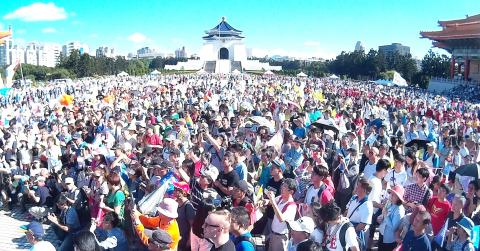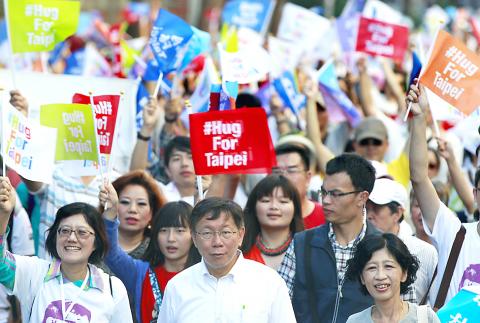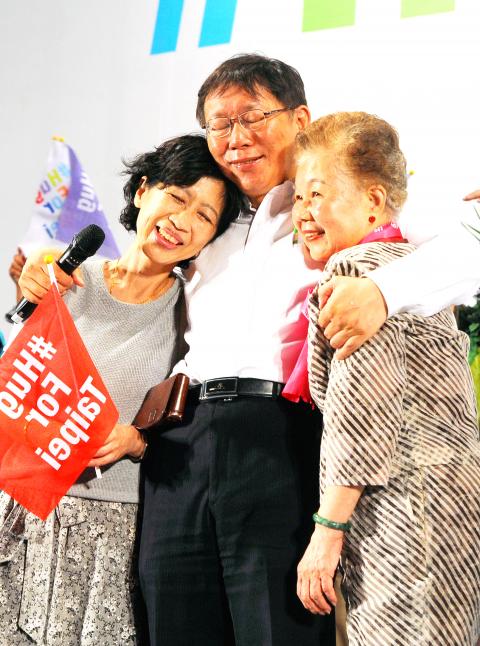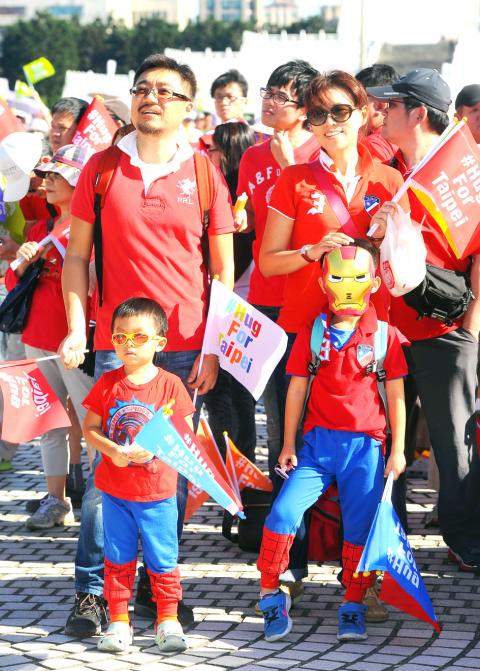More than 200,000 people, according to organizers’ estimates, took to the streets yesterday to join independent Taipei mayoral candidate Ko Wen-je (柯文哲) in a carnival-themed campaign parade, voicing their support for Ko’s “campaign for a change.”
Including samba dancers, people dressed as characters from fairy tales, giant balloons in the shape of a four-headed dragon, Mother Teresa — and the first Presbyterian missionary to northern Taiwan, George Leslie Mackay — as well as decorated floats and people holding colorful flags reading “Hug for Taipei,” thousands paraded from Liberty Square to Taipei City Hall in what appeared to be a festival celebration rather than a campaign event.
The crowd was divided into eight sections, each represented by symbolic colors: red for friendship, orange for brevity, yellow for passion, green for creativity, blue for freedom, indigo for eagerness, purple for equality and white for tolerance and dreams.

Photo: Wang Min-wei, Taipei Times
Each section was led by a float decorated with specialties and landmarks from different districts in the municipality. Although the head of the parade left Liberty Square at about 2pm, Ko, his wife and his parents, who were at the end of the parade, did not depart until 3:30pm, because the parade route was jammed.
Many marchers and onlookers cheered as Ko and his family passed by, while others were eager to point out Ko to bystanders.
Although Zhongzheng (中正) and Daan (大安) districts — where the parade passed — are considered to be Chinese Nationalist Party (KMT) strongholds, many residents waved to the parade from their windows and shouted their support.

Photo: Reuters
“I would like to thank everyone for cheerfully taking part in the parade, embracing Taipei with love, welcoming the approaching mayoral election with feelings of festivity and looking forward to realizing the change,” Ko told his supporters in front of Taipei City Hall.
“Along the parade route, I saw bright colors, creativeness, and smiles on your faces. I would like to thank you for what you did with me — we succeeded in changing the political culture in Taiwan, elections are no longer about sorrow and threats; they are bright and joyful.”
Referring to his KMT rival, Sean Lien (連勝文), who cried during his own rally on Saturday, Ko said that unlike “another person” who was in tears during another parade and made it sorrowful, “I think the objective of politics is to make people happy, not sad.”

Photo: Wang Min-wei, Taipei Times
Ko said that the parade ended at the city hall because, if he is elected, his government would be a transparent one and therefore he would “lead the people into the city hall.”
“In the past, due to differences in ideology, an invisible and cold wall had been erected in the city between you and me. The wall divided us into ‘pan-green’ and ‘pan-blue,’ pro-‘unification’ and pro-independence, nationals and imperial subjects,” Ko said. “The two sides of the wall hated each other, shouted at each other and opposed each other. We do not know when this wall appeared, or how long it has existed, but it makes our family relationships, friendships and loves suffer.”
“I am here to stand with everyone in the city, to tear down the wall with love and hugs,” he said.

Photo: Wang Min-wei, Taipei Times
Ko added that there are many challenges facing society, including an increasing wealth gap, the unequal distribution of social resources, housing injustice and injustice in education resources.
“These are all the walls we must tear down,” he said.
Police estimated that about 100,000 people attended the event.

SECURITY: As China is ‘reshaping’ Hong Kong’s population, Taiwan must raise the eligibility threshold for applications from Hong Kongers, Chiu Chui-cheng said When Hong Kong and Macau citizens apply for residency in Taiwan, it would be under a new category that includes a “national security observation period,” Mainland Affairs Council (MAC) Minister Chiu Chui-cheng (邱垂正) said yesterday. President William Lai (賴清德) on March 13 announced 17 strategies to counter China’s aggression toward Taiwan, including incorporating national security considerations into the review process for residency applications from Hong Kong and Macau citizens. The situation in Hong Kong is constantly changing, Chiu said to media yesterday on the sidelines of the Taipei Technology Run hosted by the Taipei Neihu Technology Park Development Association. With

CARROT AND STICK: While unrelenting in its military threats, China attracted nearly 40,000 Taiwanese to over 400 business events last year Nearly 40,000 Taiwanese last year joined industry events in China, such as conferences and trade fairs, supported by the Chinese government, a study showed yesterday, as Beijing ramps up a charm offensive toward Taipei alongside military pressure. China has long taken a carrot-and-stick approach to Taiwan, threatening it with the prospect of military action while reaching out to those it believes are amenable to Beijing’s point of view. Taiwanese security officials are wary of what they see as Beijing’s influence campaigns to sway public opinion after Taipei and Beijing gradually resumed travel links halted by the COVID-19 pandemic, but the scale of

A US Marine Corps regiment equipped with Naval Strike Missiles (NSM) is set to participate in the upcoming Balikatan 25 exercise in the Luzon Strait, marking the system’s first-ever deployment in the Philippines. US and Philippine officials have separately confirmed that the Navy Marine Expeditionary Ship Interdiction System (NMESIS) — the mobile launch platform for the Naval Strike Missile — would take part in the joint exercise. The missiles are being deployed to “a strategic first island chain chokepoint” in the waters between Taiwan proper and the Philippines, US-based Naval News reported. “The Luzon Strait and Bashi Channel represent a critical access

Pope Francis is be laid to rest on Saturday after lying in state for three days in St Peter’s Basilica, where the faithful are expected to flock to pay their respects to history’s first Latin American pontiff. The cardinals met yesterday in the Vatican’s synod hall to chart the next steps before a conclave begins to choose Francis’ successor, as condolences poured in from around the world. According to current norms, the conclave must begin between May 5 and 10. The cardinals set the funeral for Saturday at 10am in St Peter’s Square, to be celebrated by the dean of the College